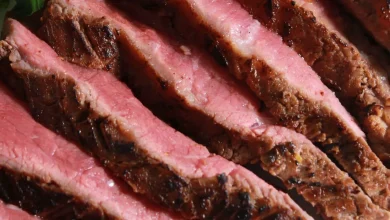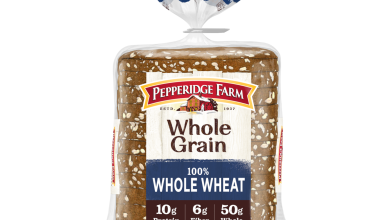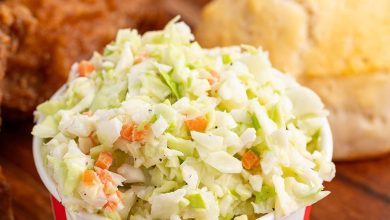Rutabaga Nutrition: Health Benefits, Recipes, and Cooking Tips
Rutabagas (Raw) – Nutritional Information and Health Benefits
Rutabagas, also known as swedes, are root vegetables that are often overlooked but offer a wealth of nutritional benefits. These hearty vegetables are a great addition to a balanced diet, providing a range of vitamins, minerals, and dietary fiber. Whether mashed, roasted, or included in soups and stews, rutabagas are a versatile ingredient that can enhance both flavor and nutrition in your meals.
Nutritional Information (per 100g of raw rutabaga):
| Nutrient | Amount |
|---|---|
| Energy | 37 kcal |
| Protein | 1.08 g |
| Fat | 0.16 g |
| Saturated Fats | 0.027 g |
| Carbohydrates | 8.62 g |
| Fiber | 2.3 g |
| Sugars | 4.46 g |
| Calcium | 43 mg |
| Iron | 0.44 mg |
| Magnesium | 20 mg |
| Phosphorus | 53 mg |
| Potassium | 305 mg |
| Sodium | 12 mg |
| Zinc | 0.24 mg |
| Copper | 32 mcg |
| Manganese | 0.131 mg |
| Selenium | 0.7 mcg |
| Vitamin C | 25 mg |
| Thiamin (Vitamin B1) | 0.09 mg |
| Riboflavin (Vitamin B2) | 0.04 mg |
| Niacin (Vitamin B3) | 0.7 mg |
| Vitamin B6 | 0.1 mg |
| Folate | 21 mcg |
| Vitamin B12 | 0 mcg |
| Vitamin A | 0 mcg |
| Vitamin E | 0.3 mg |
| Vitamin D2 | 0 mcg |
Allergen Information:
Rutabagas are naturally free from common allergens such as gluten, dairy, nuts, and soy, making them a safe and nutritious option for those with dietary restrictions or food allergies.
Dietary Preferences:
- Vegan: Rutabagas are plant-based and suitable for vegan diets.
- Vegetarian: They are a great vegetarian-friendly food option.
- Low-Fat: With just 0.16 grams of fat per 100g, rutabagas are a low-fat food choice.
- Low-Calorie: At only 37 kcal per 100g, rutabagas are perfect for anyone watching their caloric intake.
- Gluten-Free: Rutabagas are naturally gluten-free, making them an ideal option for individuals with gluten sensitivities or celiac disease.
Health Benefits:
Rutabagas offer a variety of health benefits, thanks to their rich nutrient profile:
- Rich in Vitamin C: With 25 mg of vitamin C per 100g, rutabagas help support the immune system, promote healthy skin, and combat oxidative stress.
- High in Dietary Fiber: Rutabagas are an excellent source of fiber, providing 2.3 grams per 100g. This supports digestive health, aids in weight management, and helps regulate blood sugar levels.
- Potassium Powerhouse: Rutabagas are a good source of potassium (305 mg per 100g), which is essential for maintaining proper heart function, regulating blood pressure, and supporting muscle and nerve health.
- Rich in Minerals: With significant amounts of calcium, magnesium, and phosphorus, rutabagas help support bone health, muscle function, and overall cellular processes.
- Low in Fat and Calories: Rutabagas are an ideal food for those looking to maintain or lose weight, as they are low in both fat and calories, but high in fiber to help you feel full longer.
Tips for Preparing Rutabagas:
- Roasting: Peel and chop rutabagas into cubes or wedges, drizzle with olive oil, and season with your favorite herbs and spices. Roast at 400°F for about 25–30 minutes, or until tender and slightly caramelized.
- Mashing: Similar to mashed potatoes, rutabagas can be boiled and mashed with a little butter, salt, and pepper. You can even mix them with potatoes for a flavorful twist on the classic dish.
- Soups and Stews: Add rutabagas to soups, stews, or casseroles for a hearty, nutritious addition. Their mild, slightly sweet flavor pairs well with root vegetables, meats, and savory herbs.
- Raw: Rutabagas can also be eaten raw in salads or as part of a vegetable platter. Simply peel, thinly slice, and enjoy with a dip.
Conclusion:
Rutabagas are an underrated yet highly nutritious vegetable that can easily be incorporated into a variety of dishes. With their rich supply of vitamins, minerals, and fiber, they offer numerous health benefits, making them a fantastic addition to your regular meal planning. Whether you’re roasting, mashing, or adding them to a comforting soup, rutabagas are versatile, easy to prepare, and a great choice for a healthy lifestyle.








